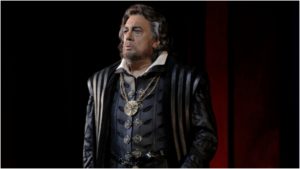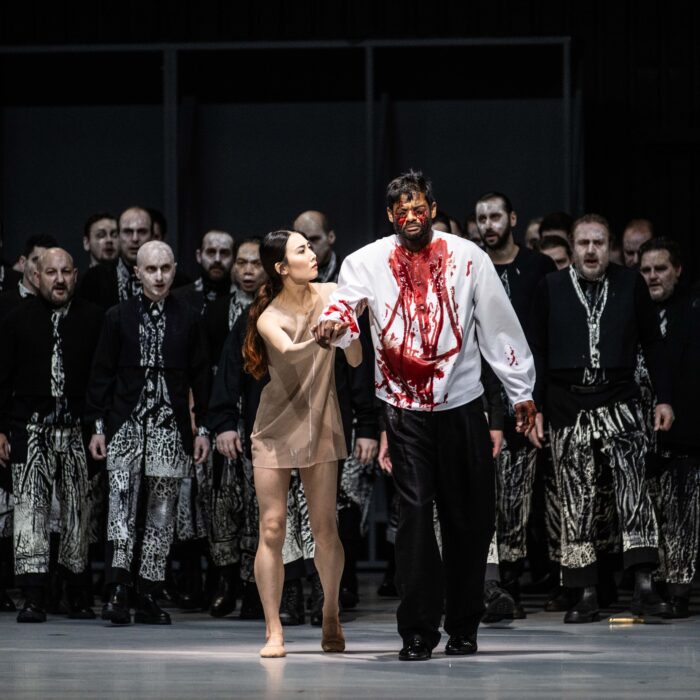
Los Angeles Opera 2018-19 Review: Don Carlo
Plácido Domingo Adds New Dimension To Verdi Masterpiece Alongside Brilliant Cast
By Gordon WilliamsI arrived at the Dorothy Chandler Pavilion on Thursday night, Oct. 11, 2018, just in time to catch some of conductor James Conlon’s pre-performance talk to several hundred audience-members attending that evening’s Los Angeles Opera production of Verdi’s “Don Carlo.” Yes, Conlon regularly delivers these incredibly insightful introductions to the evening’s opera even as he’s about to go out and conduct in a 3,156-seat theater for the next several hours. He also provides a substantial essay for the program booklet.
But that’s not my point. I arrived at the moment that Conlon was demonstrating the last bars of the opera with a recording. “Mio padre” sings King Philip II as the ghost of his father Emperor Charles V delivers the opera’s ostensible message: that only the tomb can heal the anguish of mortal life. “O ciel!” sings Ana María Martínez that night’s Elisabeth of Valois, holding her final top B – as is something of a tradition – for several thrilling bars longer than Verdi specified.
I know that Verdi often used to stress single words as the keynote of a particular work – “curse” in “Rigoletto;” “vengeance” in “Il Trovatore.” Here, in “Don Carlo,” “father” and “heaven” are the last words. It is an underlying question in this work – where does authority lie, which monarch? – and I found this LA Opera production very clear in delineating the strands of this debate.
Father And Heaven
In general terms, director Louisa Muller deserves credit for the work on stage that was often beautifully expressive of the shifting relationships between the opera’s many principals – Carlo, Rodrigo, Elisabeth, Eboli, Philip, the Grand Inquisitor. I particularly enjoyed the “blocking” of the Act one trio where Rodrigo (Plácido Domingo) brings Elisabeth a note from Carlo and keeps Eboli (Anna Smirnova) distracted with pleasantries while Elisabeth reads it. It was a refreshingly light-hearted sequence in what is, admittedly, a pervasively dark piece.
But deeper meaning was enhanced by the productions’ overall conception. In one sense, “Don Carlo” is a study in paternal authority. To cement a peace with France, Philip II of Spain has married Elisabeth of Valois, his son Carlo’s fiancée. Of course, we start by wondering how Carlo feels, but Ian Judge’s production (this was a restaging by Louisa Muller) kept me thinking about the story’s ultimate source of power. John Gunter’s red-and-black set, with its multiple and shifting arches, often led my attention back beyond the enclosed forestage where all the power-plays were made.
In the opera’s opening moments white-cassocked figures wandered these arcades but the sound emanated from further backstage, the first of the opera’s “voices from elsewhere” (others being Charles V’s voice at the end of the opera and the heavenly voice – a soprano – that sings for the souls of those who will be burnt in Act two’s Auto-da-fé). I kept getting a sense of “further and further back;” “look deeper.”
Lost Their Chance
Having said all that, you might wonder if the “Don Carlo” love story has much importance. As Elisabeth and Carlo, Ana María Martínez and Ramón Vargas came across credibly as a pair who’d lost their chance. There was sad subtext in Elisabeth’s official position (and Martínez’s restrained delivery) that she would help Carlo get an assignment to Flanders if that was what he truly wants.
And although Vargas betrayed believable pain when conceding that all is “perduta,” there was a clean resolve to his singing that suggested he was trying to “move on.” On the other hand, while noticing how easily Vargas reached his top notes, I also often noted the effectiveness of his physical gestures – a despairing shrug, for example, a forlorn hand movement. Several times during the performance I thought, “He really knows what to do with his hands.”
Alexander Vinogradov, as Philip, also provided some striking examples – a hand held out for Elisabeth to join him, back turned to her, on his first mute entrance, a flick of the index finger on “Restate” when he wants a moment of Rodrigo’s time (in order to draw away Rodrigo from allegiance to his son).
As Elisabeth, Ana María Martínez, has her big show-stopping number at the beginning of Act four, a few hours later, but there was real, early sense of the emotional buffeting her character takes in the opera’s opening scenes. Elisabeth didn’t want to marry Philip, she hankers for his son but has suppressed it. When one of Elisabeth’s favorite ladies-in-waiting is sent back to France, that’s too much – there was real loss in the faint trailing-off wisps of Martínez’s melody.
Anna Smirnova’s Eboli was a portrait in contrast. She was formidable when expressing the character’s strength of determination to take revenge when she (Eboli) discovers that it is Elisabeth, not her, who is the object of Carlo’s intentions. But she also expressed a genuinely penitent attitude when she realizes the harm she has done in planting implicating evidence in Elisabeth’s casket. “O mia Regina, io t’immolai.” I scribbled “beautiful” on my notepad in the dark. The bright Spanish dance rhythms of Eboli’s ‘Veil Song’ in Act one with Smirnova’s markedly clear melismas and her chorus of thirds with Taylor Raven’s Tebaldi made for another of the opera’s gratefully-received precious lighter moments.
Imposing Strength
But I mentioned earlier the scene where Philip sends Elisabeth’s lady-in-waiting back to France. This was also our first opportunity to take the vocal measure of the production’s Philip. Russian bass, Alexander Vinogradov, gave us a first impression of imposing strength and actually built it from there. In the big Act two finale, after Carlo has been disarmed and Philip reasserts his authority, I admired how Vinogradov could dominate (vocally) a 60 foot-wide fully-populated stage. (It wasn’t just the crown he was wearing, although that was an effective part of Tim Goodchild’s judiciously-applied costume scheme). And of course, a Philip also has to express his vulnerability. In the next Act, Philip reveals his essential loneliness in “Ella giammai m’amò,” one of Verdi’s greatest arias. The expressive arc of Vinogradov’s interpretation was the opportunity for the first of the second-half’s several show-stopping moments of applause.
But then (cue: William Wood’s suitably creepy contrabassoon), there is someone in this story even more powerful. Can Philip II’s power be topped? Yes, when Morris Robinson is the Grand Inquisitor. And that’s without Vinogradov’s Philip being diminished in the slightest.
I’d first like to say something about the chorus. In terms of stage movement, this was often a real, believable crowd. Louisa Muller and choreographer Kitty McNamee deserve credit. But so too the chorus director, Grant Gershon.
And of course, it was all under the direction of James Conlon in whose hands the orchestra provided tactful, precise, effective accompaniment. I couldn’t help noticing the exacting punctuation of Gregory Goodall’s work on the timpani. But beyond, that Conlon educed a wonderful emotional shape. The prelude to Act four was actually cathartic.
And Then There’s Domingo
And what of Rodrigo? I had never heard Domingo live until moving to LA. I missed out on being in any theater for his great tenor roles. But now at least I’ve heard him as a baritone. And admittedly the quite incredible thing for me is that his voice sounds so rich and young and I sat through Thursday’s performance looking forward to and being rewarded every time he came onstage.
“In the part of Rodrigo?” you might say. “He was once one of the great Don Carlos.” Well, there’s lots of meat to Rodrigo. But here’s what’s really interesting. This is casting that contributes to the opera’s themes. Domingo is not Rodrigo’s age. Rodrigo should be, at most, a little bit older than Carlo, a headstrong young revolutionary. But in this opera, where paternal authority is so important, where Carlo’s biological father has usurped him, a Rodrigo that is noticeably older comes across as more than a sensible mentor. He comes across as a surrogate father. The stakes go up: Rodrigo’s betrayal and reconciliation with Carlo become even more important and poignant. And maybe even a little more in keeping with the play on which Verdi’s opera was based, Friedrich Schiller’s “Don Carlos.” For there is a letter from Schiller, written in 1787, in which he says that he outgrew Don Carlos, “Posa [Rodrigo] began to take his place”.
But then the opera (and we’ve been talking here about the 1884 version) begins and ends differently from Schiller’s play. In Verdi, the ghost of Charles V (described in the program booklet merely as a Friar) returns with his Act one message. Solomon Howard admirably took on this awesome responsibility.


